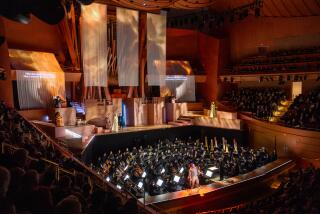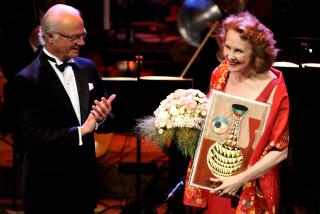Korngold’s Opulent ‘Heliane’
KORNGOLD: “Das Wunder der Heliane.” Anna Tomowa-Sintow, Harmut Welker, John David de Haan, Nicolai Gedda, others; Rundfunk Chor Berlin; RSO Berlin, John Mauceri conducting. London 436 636-2 (3 CDs). Part of the initial release in London’s “Entartete Musik” (degenerate music) project, Erich Korngold’s 1927 opera “Das Wunder der Heliane” is a stunner. Written in an ultra-saturated, ever-shifting harmonic language, turbulently scored for large orchestra (including five keyboards and offstage brass), with hugely demanding vocal roles, Korngold’s music accomplishes the considerable feat of rendering the mystical, expressionistic and erotic plot of “Heliane” both believable (in context) and riveting. This music is opulent and gooey, sinister and muscular, and changes moods as quickly as rushing clouds block the sun. Mauceri leads a combined effort of consistent intensity, the RSO Berlin in particular displaying impressive heft and flexibility. Though everyone in the cast at one time or another allows the effort of singing this difficult music to show, none of them is ever less than secure, polished and forceful. As Heliane, Anna Tomowa-Sintow negotiates the dangerous leaps and bounds of her role with pliant skill and brings rich, ringing high notes to the climaxes. John David de Haan is the sweet-voiced Stranger, managing a convincing Heldentenor when required. London’s production keeps the mayhem balanced and clear, while the liner notes recount the fascinating intrigues surrounding the work’s premiere, its eclipse by Krenek’s “Jonny spielt auf” and eventual ban by the Third Reich.
*
MAHLER: Symphony No. 3. Symphony No. 10 (Adagio). Israel Kibbutz Choir; Israel National Choir “Rinat”; Ankor Children’s Choir; Florence Quivar, mezzo-soprano. Israel Philharmonic Orchestra, Zubin Mehta conducting. Sony Classical S2K 52579 (two CDs). It takes a special talent, a talent that doesn’t surface here, to alleviate the longueurs of this work. Mehta’s take on Mahler is a strangely faceless one, especially compared to the personal advocacy of other Mahlerites. This conductor seems to hold little interest for the minutiae of phrase building--the whole symphony feels generalized, and only partially, if competently, realized. One notices missed opportunities, rather than admires the poetry. A lack of bravado is not the problem (it never is with this conductor), but without the rest, it feels empty. The Israel Philharmonic plays solidly enough (especially the brass), but not spectacularly--there isn’t a single memorable woodwind solo, for instance, and the lower strings sound weak. The contribution of Quivar--who recently sang the Second Symphony at Hollywood Bowl with this conductor and orchestra--is rich and forthright, while the various choirs sound diffuse and distant.
More to Read
The biggest entertainment stories
Get our big stories about Hollywood, film, television, music, arts, culture and more right in your inbox as soon as they publish.
You may occasionally receive promotional content from the Los Angeles Times.










